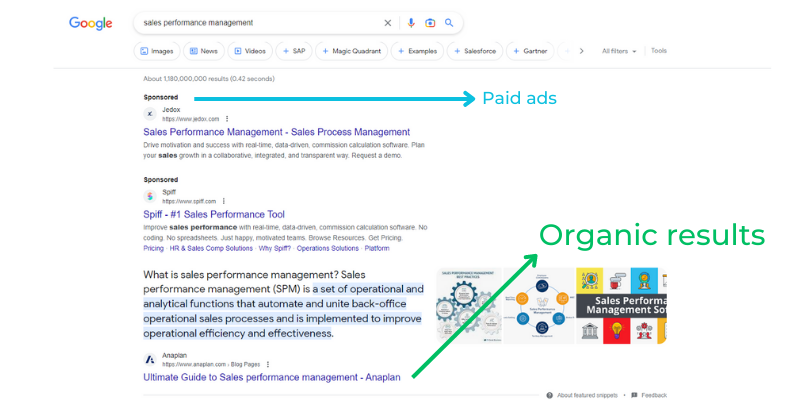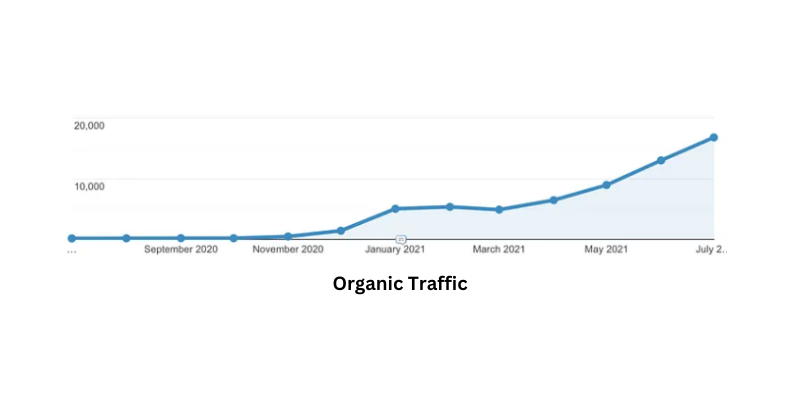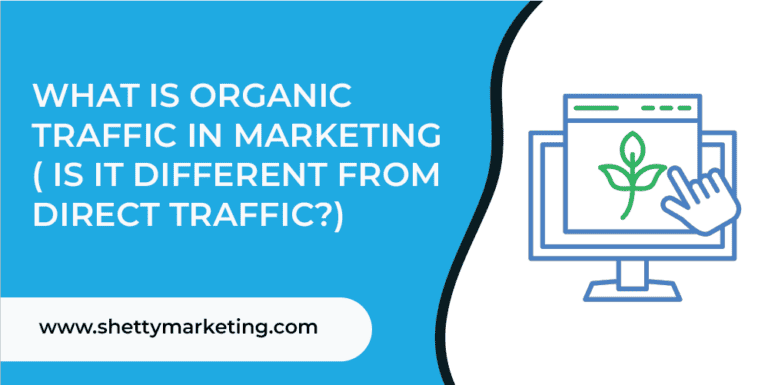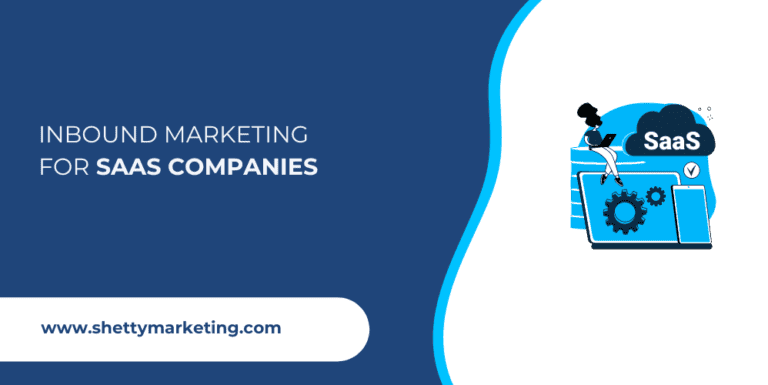In marketing, organic traffic refers to the visits that a website receives from search engine results that are not paid for through ads.
When a user enters a query in a search engine, they are presented with a mix of organic results and paid search ads.
The organic results are the pages that rank right below sponsored search results, and when a user clicks on one of these results to visit a website, it is recorded as organic search traffic in analytics tools.

I’m sure many of us have discussed the importance of driving traffic to our websites or blogs, particularly organic traffic because it’s often viewed as “free.”
But, have you ever stopped to think whether organic traffic is actually free?
In this blog, we’re going to explore what organic traffic is and whether it’s truly free. Plus, we’ll walk you through how organic traffic can help your marketing efforts. So, let’s dive in!
Why is organic traffic important?
Organic traffic is one of the most important ways to get noticed online.
Unlike paid traffic, which can really drain your budget, organic traffic is free and sustainable. Just by creating awesome content that your target audience is looking for, you can get more people interested in what you do.
Plus, organic traffic is known to have a higher conversion rate than other types of website traffic!
Because people searching for information related to your niche are more likely to get involved with your content, sign up for your newsletter, or even buy something from you.
There’s a lot of value in organic traffic in the long run. Sure, paid traffic can give you faster and more immediate results, but it’s not sustainable over time.
So if you’re looking to build a lasting online presence, it’s important to focus on organic traffic. That means creating excellent content and optimizing your website for search engines.
Is organic traffic worth it?
Yes, organic traffic is worth the investment and the effort
In fact, according to a recent study, organic search traffic has been responsible for 53% of websites’ website traffic on average. That’s a huge potential customer base that can be reached by optimizing your website for organic search.
When it comes to revenue generation, Canva was able to increase its revenue by a whopping 487% in just two years thanks to its targeted search engine optimization (SEO) efforts.
By optimizing its website for relevant keywords and providing high-quality content that answered potential customers’ questions, Canva was able to attract more organic search traffic resulting in more potential customers and ultimately, more revenue.
By focusing on providing relevant content and optimizing your website for search engines, you’re setting your company up for long-term success and sustainable revenue growth.
Learn more: How much business is driven by organic traffic
How long does it take to get organic traffic?
It takes around 6 months to a year to get organic traffic on average.
However, there are some factors that can affect this timeline. For example, the industry or niche you are in, your competition, and how much effort you put into sharing your content can all impact your results.

The key to getting organic traffic is having a well-planned content marketing strategy. You need to consistently create high-quality content that is relevant and valuable to your audience.
On top of that, it’s important to optimize your content for search engines by including relevant keywords and meta descriptions.
It’s also important to track your traffic over time so you can analyze your results and adjust your strategy accordingly. Tools like Google Analytics can be extremely helpful for this.
In summary, getting organic traffic isn’t something that happens overnight. It takes time, effort, and patience. But with a solid content marketing plan and consistent effort, you can drive consistent and long-term traffic to your website.
Is organic traffic free?
The simple answer is no, organic traffic is not always free.
While it’s true that organic traffic is considered “unpaid,” there are many paid marketing activities that can ultimately lead to organic traffic.
For example, if you hire a content writer or a marketer to create content for your blog, the traffic that comes to your website as a result will be organic. But, of course, you will have had to pay for the content marketing that led to that free organic traffic.
However, the great thing about organic traffic is that, in the long term, it doesn’t cost you anything.
If you create high-quality content that is optimized for search engines and appeals to your target audience, it can continue to drive traffic to your website for years to come.
What’s more, organic traffic is specifically targeted to people who are interested in your business and what you offer.
This is different than paid advertising, which can attract a wide range of visitors that may not all be relevant to your business.
Because organic traffic is targeted at people who are already interested in what you have to offer, it’s more likely to result in conversions and sales for your business.
Direct traffic vs Organic search
When it comes to getting traffic to your website, there are a lot of different ways people can arrive on your site. Two of the most common ways are through direct traffic and organic search.
Direct traffic is basically when someone types your website URL directly into their web browser or has a bookmarked link that takes them straight to your site.
Now, you might think that it would be pretty easy to differentiate between these two types of traffic, but it turns out it’s not always that simple. In fact, research has shown that over half of the traffic that’s labeled as direct traffic is actually from organic search results!
How does this happen, you ask?
Well, sometimes when someone visits your website, their browser doesn’t report where they came from, so your analytics tool just assumes that it’s direct traffic.
This can be misleading because you might think that people are going directly to your website when they’re actually finding you through search engines.
Because of this, it’s super important to properly track and analyze your website’s traffic sources so that you can get a clear picture of where your visitors are coming from and how they’re finding your site.
How much organic traffic is good
Firstly, the number of unique visitors a website receives per month is a great benchmark to assess its performance.
Of course, the number of unique visitors can vary quite widely depending on the size and niche of the site.
For example, a small niche blog may only receive a couple of hundred unique visitors per month, while a large e-commerce site may get hundreds of thousands or even millions of unique visitors per month.
Another important benchmark to consider is the number of page views a website receives per month.
According to SimilarWeb, the average website receives around 50,000 pageviews each month. However, keep in mind that these numbers can vary significantly depending on the website’s objectives and niche.
Apart from these benchmarks, it’s also crucial to consider the website’s conversion rate and bounce rate. A good conversion rate for an e-commerce site is around 2-3%, which means that for every 100 visitors, 2-3 will make a purchase.
If the conversion rate is low, it may indicate that the website needs to improve its user experience or target a different audience. On the other hand, a high bounce rate suggests that people are leaving the website after visiting only one page.
This could be due to poor website design, lack of relevant content, or other issues. A good bounce rate is usually between 40-60%.
Ultimately, there is no one-size-fits-all approach when it comes to the amount of organic traffic that’s considered good for a website. It all depends on your specific situation.
However, considering unique visitors, pageviews, conversion rate, and bounce rate can be incredibly helpful in assessing the performance of your website’s organic traffic.
Why does organic traffic decrease
There are several reasons why organic traffic can decrease, and it’s essential to identify the root cause to address the issue.
Tracking
Tracking can be one of the reasons why you are not able to see organic traffic on your site.
There are a bunch of different reasons why this might be happening, but one possibility is that the tracking code on your website got deleted by accident. Don’t worry though, there are a few ways to check whether the tracking code is still there.
One of the best methods is to use the real-time reporting feature on Google Analytics.
To access this, go to Google Analytics 4 and click on the “real-time” tab on the left-hand side of the dashboard.
From there, you should be able to see the “Views by Page title and screen name” block on the bottom-right section of the page.
This handy section shows the number of users who have visited your website in the last 30 minutes. This is a great indicator that your tracking is working as it should be.
If not, go through the following video to set up the Google Analytics tag
Seasonality
Once you are done checking whether the tracking is working fine, Seasonality is the next factor to consider.
The trend of a website can be influenced by the market trend, and a decrease in user interest in a key topic can lead to a downturn in website traffic.
For example, if you own an e-commerce store, you may see an increase in traffic on Christmas Eve.
Crawlability
If you’re experiencing a dip in organic traffic on your website, the issue could be crawlability.
This means that if search engine spiders are being blocked from accessing your website, it can cause your website to disappear from search results which means no traffic — yikes!
A simple robots.txt file looks like this:
User-agent: * Disallow: /cgi-bin/ Disallow: /images/ Disallow: /pages/thankyou.html
This would block all search engine robots from visiting “CGI-bin” and “images” directories and the page “http://www.yoursite.com/pages/thankyou.html”
Notice that before the Disallow command, you have the command: User-agent: *.
This part specifies which robot you want to restrict access to. Major crawlers include Googlebot (Google), Googlebot-Image (Google Image Search), Baiduspider (Baidu), and Bingbot (Bing).
If any of the above bots are listed after “User-agent:”, it means that the bots are not crawling your site, which is why you are seeing a decrease in organic traffic.
Google updates
Lastly, Google SERP updates can impact search engine optimization.
Google makes adjustments to its algorithm frequently, and these updates can address different aspects of the algorithm, making it behave more similarly to the user’s behavior.
It’s essential to stay up-to-date with these updates and adjust search engine optimization strategies accordingly.
I usually check for updates on the Cognitive SEO website
Best organic traffic sources other than Google
Below are some of the best organic traffic sources (Other than Google) in 2023
UGC websites
UGC, or User Generated Content, websites are a great way to drive organic traffic to your site.
One of the best UGC sites to use for this purpose is the Q&A site. Answering questions on sites like Quora, Reddit, and Yahoo can help bring in traffic that is interested in your niche.
By providing valuable answers and linking to your website, you can attract potential customers to your site.
Another platform to consider is ratings and review sites. These sites are where users go to learn more about a product and its specifications. By having positive reviews on these sites, you can attract more traffic to your website.
Users are more likely to trust a product with positive reviews, and they may click through to your site to learn more about who you are.
When using UGC sites, it’s important to remember that you should provide valuable information and not just spam your links.
By being helpful and providing useful information, you can establish yourself as an authority in your niche and gain more traffic to your site.
Social media groups
One common mistake is to share posts on Facebook groups solely to drive traffic to your website. This approach will only make you look like a spammer and likely result in no clicks or engagement.
Instead, engage genuinely in posts and show interest in what others have to say. Drop valuable comments on Facebook groups and LinkedIn groups that can add to the conversations and offer value to the members. By doing so, you can establish yourself as an expert in your niche and build relationships with potential readers.
When using social media groups for organic traffic, it’s important to be consistent and engage regularly. Don’t just drop in once in a while and expect results. Instead, make it a part of your daily routine to engage with others in your niche and offer value to the community.
In conclusion, social media groups can be a powerful tool for driving organic traffic to your website. Just remember to engage genuinely, offer value, and be consistent in your efforts.
Did you know that Pinterest can be a great source of organic traffic for businesses?
But, there’s a trick to it- you need to make sure that your website has pin-worthy images on every page. T
his is especially important for product pages and pages with valuable content because those are the types of pages that are more likely to be shared on Pinterest.
So, what makes an image pin-worthy?
Well, the easiest way to find out is to check out images shared on Pinterest from websites similar to yours. This will give you a great idea of what types of images your target audience is most likely to engage with and click through in order to visit your site.
By creating images that resonate with your audience, you can easily drive a ton of organic traffic to your site from Pinterest. How cool is that?!
DuckDuckGo
DuckDuckGO has been gaining more attention lately, and some are even questioning if it could impact the world of organic traffic.
When it comes to search engines, Google is the big name that comes to mind. But DuckDuckGo is different in that it’s focused on protecting user privacy by not tracking search history or collecting personal information. This is a big deal for people who want to keep their searches more private and secure.
So how does this relate to organic traffic? Well, since DuckDuckGo doesn’t rely on user data to show ads, it operates differently from Google. It doesn’t offer search ads at all, relying instead on partnerships and other means of revenue.
I have written a separate post on this, you might want to give it a read.
Related: DuckDuckGo Organic Traffic: Is It Better Than Google? A Comprehensive Comparison
Forums
One of the best sources of organic traffic is discussion forums. By being active in these forums, you can engage with your audience and build relationships with them.
In order to get traffic from discussion forums, you should be present and publish something at least a few times a week. This will help you stay top-of-mind with your audience and keep them engaged with your content.
It’s also important to have a link to your blog in your forum signature. This way, people can easily click through to your blog and check out your content
. Make sure to add a link to a blog post that is related to the discussion forum, so people are more likely to click through and read your content.
When you’re active in discussion forums, it’s important to connect with other people and join the discussions. But it’s even more important to start new threads. By starting new threads, you can attract more people to your content and engage with them on a deeper level.
Every time you publish a comment or start a thread, make sure you’re adding value to the conversation. This will help you build your reputation as an expert in your niche and attract more organic traffic to your site. And don’t forget to stay subscribed to the threads you’re active in and read most of the new comments.
If you can add more value to the thread, do it! This will help you build stronger relationships with your audience and attract even more organic traffic to your site.
There you go, I hope this blog helped you understand what organic traffic is. If you are interested to learn how to drive organic traffic you your business site, I have written a separate blog on it. Do check it out!





